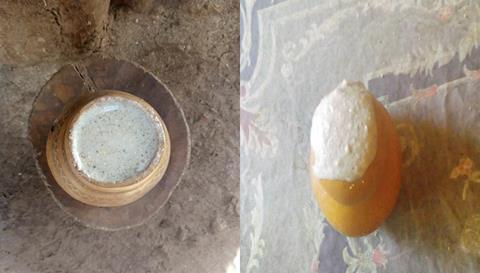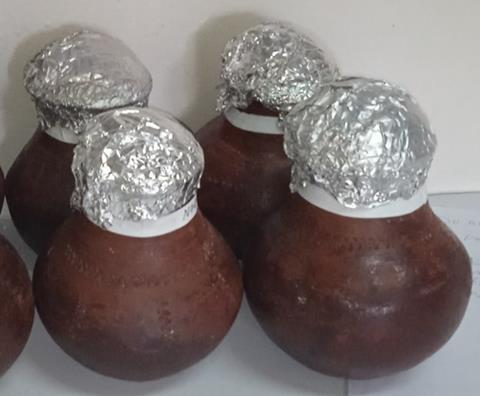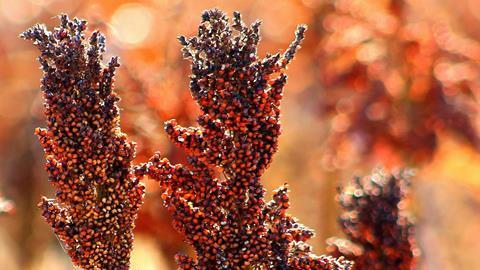Sub-Saharan African societies have a wealth of knowledge on cereal fermentation as a means of food processing and preservation.
These processes and traditions are passed down through generations and are currently understudied and undocumented in the scientific literature. Cereals such as maize, barley, millet, wheat, and sorghum are used for the production of these traditional beverages. The production process of these cereal beverages is spontaneous, mainly depending on the microbial community present in the fresh product.
Since starter cultures are not used, though these spontaneous fermentations are robust, the products are variable and uncontrolled, with their quality and stability less predictable. Selection of appropriate starter cultures is, hence, one of the most important approaches to making the fermentation processes efficient, controllable, predictable, and up-scalable. Specific lactic acid bacteria (LAB) are of special interest as starter cultures since they do not produce a large amount of alcohol and are “generally recognized as safe (GRAS)” for addition to food. For cereal fermentations, starter cultures are usually isolated from the food product itself, via autochthonous retrieval.
Over the last few decades, increased attention has been given to probiotic starter cultures as they combine fermentation capabilities with probiotic properties such as the ability to inhibit enteric pathogens. This is highly significant for countries such as Ethiopia, as foodborne infections are a major cause of morbidity and mortality. Among the Ethiopian indigenous fermented cereal-based beverages, Naaqe and Cheka are the most commonly produced and consumed – especially in southern Ethiopia – and are embedded in the social culture. When served, these drinks show a gesture of friendliness and hospitality, and strengthen cordial relationships between individuals. The probiotic potential of LAB from Cheka and Naaqe has not yet been explored however, and no information is available in the scientific literature on Naaqe. This has led researchers from Ethiopia and Belgium to isolate and characterize LAB from Cheka and Naaqe, as potential probiotic starters. These LAB were then identified and screened for in vitro probiotic potential (i.e. antimicrobial activity, viability, stress tolerance, and immunostimulatory activity), and their capacity as starter cultures in laboratory-scale fermentation experiments.

Probiotic starter culture properties
Diarrheal diseases (the most common causative agent being Salmonella spp., followed by E. coli), are reported to be the second most important contributors to the total burden of all disease types and the second leading cause of premature deaths in Ethiopia.
From the isolates gathered from our traditional beverages, 24 isolates were presumptively identified as LAB. From these isolates, two from Cheka and 12 from Naaqe were selected for species level identification (Limosilactobacillus fermentum being the predominant) and characterization of their probiotic starter culture potential. The selected isolates showed resistance to 0.5% bile salt and low pH (pH 3), indicating their applicability for oral administration as beneficial microbes. The LAB isolates were screened for their antimicrobial activity against nine indicator pathogenic strains across five species (Listeria monocytogenes, Staphylococcus. aureus, Escherichia coli, Salmonella enterica subsp. Enterica Typhimurium, and Shigella flexneri) using radial diffusion and spot overlay assays. Several strains identified as Limosilactobacillus fermentum, Weissella confusa, W. cibaria and Pediococcus pentosaceus were either active against gram-negative pathogens or displayed superior antagonistic activity, indicating the broad-spectrum antagonistic activity of the selected LAB isolates as well as their promising applicability against infectious diseases.
Immune Modulation
In addition to antimicrobial activity, another key health-promoting property of beneficial bacteria is the ability of LAB strains to modulate the immune system. This mode of action can provide protection against diseases related to immune imbalances, such as allergic diseases, inflammatory bowel disease (IBD), invading gut pathogens, and even COVID-19.
Nuclear factor kappa B (NF-κB) activation by LAB could also help stimulate antipathogenic immune responses and the correct development and regulation of immune self-tolerance. Some of the selected probiotic starters demonstrated immunomodulatory activity in THP1-Dual™ monocytes, which was displayed by their capacity to stimulate the NF-κB and interferon regulatory factor (IRF) pathways as key factors in the antimicrobial protective mechanisms. Because the main target application for these probiotics is inhibiting gastro-intestinal infections and enhancing host defense against pathogens, a moderate induction of NF-κB was considered a desirable property. Notably, the NF-κB and IRF induction by all the tested LAB strains was much lower compared to the pathogenic S. aureus MI/1310/1938-MSSA, but was comparable to that of the model probiotics L. rhamnosus GG and L. plantarum WCFS1. This led us to hypothesize that all the tested LAB isolates would be safe from an immunostimulatory perspective, as they only cause a moderate induction of NF-κB, which was similar or lower compared to the established probiotics. Lack of excessive immune stimulation in susceptible individuals is one of the safety assessment criteria required by WHO for live microorganisms intended to be added in foods and feeds. Importantly, the NF-κB induction by the tested LAB strains was also remarkably strain-dependent, highlighting that it is vital to screen different strains from the same species.
Based on an overall evaluation of the probiotic and growth properties of the LAB isolates, six isolates were selected as candidate strains for further fermentation experiments using Naaqe and Cheka (Figure 2). Specifically, four starter cultures were selected for Naaqe fermentations and two starter cultures for Cheka fermentation experiments. The strains and their mixtures were used to ferment Naaqe or Cheka for 3 days and, their fermentative activities (pH and cell viability) were evaluated in situ.

Acid production along with its associated lowering of pH, and the maintenance of an adequate level of viable probiotic bacteria are among the key requirements for effective functional foods. To assess the fermentation quality and reproducibility, we used pH and viable LAB counts as important read-out parameters. In our mock fermentation experiments, viable LAB concentrations increased above the threshold of 6 log CFU mL-1 after 48h of primary fermentation in all fermentations.
In the process of cereal fermentations there is a succession of fermentation organisms with the last organisms in the chain being LAB. In the primary fermentation processes of Naaqe and Cheka, all of the six isolates tested as starters were shown to significantly enhance the fermentation compared to the control experiment of spontaneous fermentation across three days. Addition of the candidate starter cultures in the Cheka primary fermentation was also seen to help force the fermentation towards a LAB-based fermentation with little to no alcohol produced, instead of an alcoholic fermentation. Importantly, the tested strains also enhanced fermentation better when combined in a multi-strain mixture. In addition to improved fermentation capacity, combining LAB starter cultures with different beneficial modes of action could lead to multiple health benefits of the resulting fermented product.
In the secondary fermentation processes, pH decreased below 4.6, which is an important food safety threshold for all fermentations at the time when the product is usually consumed. LAB cell counts increased during the secondary fermentation of Naaqe and Cheka, indicating an enhancement compared to spontaneous fermentation.
Cheka and Naaqe could thus be a carrier for delivering live probiotic LAB to consumers.
The tested strains also enhanced fermentation better when combined in a multi-strain mixture.
Our laboratory-scale fermentation experiments showed overall that the tested autochthonous LAB isolates could be promising starters (with respect to pH lowering and LAB count) for both Naaqe and Cheka fermentation processes. Both Cheka and Naaqe could be good potential carriers for future probiotic strains. Overall, we demonstrated that six LAB isolates have promising antimicrobial activities, gastrointestinal tolerance, and promising starter culture properties related to fermentation and growth. These two traditionally used, spontaneous fermentation processes could thus benefit from the use of a dedicated starter culture to remove inter-batch differences and be enhanced with the specific health-promoting properties of the probiotic starters.
The work covered in this feature is published in Journal of Applied Microbiology, and can be accessed here.








No comments yet